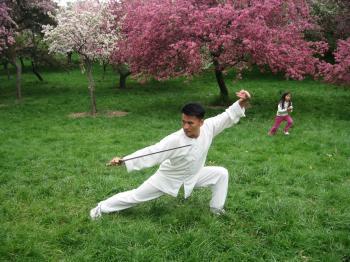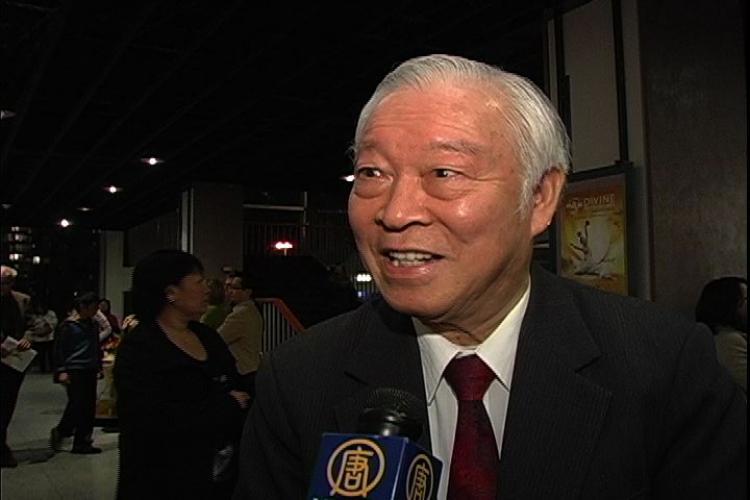NEW YORK—Martial arts have long captivated the West since the days of Bruce Lee and other kung-fu movie heroes. Yet the idea that the art is only to be used for fighting is a terrible misconception, explained martial arts Master Longfei Yang, founder of the International Xin Wu Men Martial Arts Association.
According to Mr. Yang, the art stretches deep into ancient cultures, giving people a way of reconnecting with old traditions. He said that he founded the Xin Wu Men Association in 2008 in hopes of preserving this ancient art.
“I’m here in America promoting the traditional Chinese martial arts, concentrating on martial arts to help people understand body, mind, and the universe—how they harmonize and balance together,” said Mr. Yang during an interview before his Tuesday night class in Manhattan.
“The fighting part is just one part of the arts. It’s just one subject to learn to defend yourself. Very few people use martial arts to fight anymore,” he laughed. “Most people learn it for health, keeping the mind clear and the body in a healthy and balanced condition.”
Mr. Yang, 37, began his martial arts training at the age of six in Hohhot of Inner-Mongolia. His grandfather, Yang Jian Jiou was his first master, and passed on to him the slow moving art of Tai Chi Chuan. He later moved on from the internal martial arts style to study under masters of various external forms, including Shaolin and Bruce Lee’s Jeet Kune Do, “the Drunken Fighter.”
Despite this broad training, Mr. Yang said that it took him a bit to fully understand the true meaning of the arts. “I thought martial arts were all about fighting, you know, showing off, because when you’re young you don’t have much of an understanding,” he said.
It was a 60-year-old Master of internal martial arts who changed this notion, Mr. Yang explained.
“I found that through all my studies, I could do nothing to him. I found that it’s not through how much you train, but in how much you understand,” he said. “I used to think the [old] traditions are too far from today’s lifestyle, but it’s really not true.”
“If you want to learn martial arts, you actually need to learn to understand yourself,” Mr. Yang explained.
The internal arts, such as Seven Star Mantis, Tai Chi, and San Xi Ren Shi often include still meditation postures and forms that are sometimes practiced for hours. He explained that learning to calm the mind and relax the body are among the most difficult skills to master, yet its reward is far beyond anything of the fighting arts.
“From there you don’t feel you want to fight someone. [Instead] you feel you have a lot of things to learn,” Mr. Yang said, adding that the “the more people learn [the art] the more humble, more peaceful [they become.]”
“It’s much better than going to the gym or going running because a lot of times people working physically actually gain a lot of body damage. An internal art concentrates on the organs, channels, and muscles—all working as one. It’s best to learn to balance yourself. It makes you happier, less stressed,” he said.
“Most people are more aggressive, more into the physical. They can’t control themselves because the balance of the inner and outer are breaking up.”
Through this understanding, Mr. Yang moved on to become the first certified instructor of San Xi Ren Chi Seven Star to establish a school of martial arts outside mainland China. He first made his way to South Africa and later to the U.S. He has also served as a judge in the international martial arts competition since 1999, has written several books, and has made several television appearances. In 2001 he received the “World Outstanding Life Achievement and Golden Performance Award.”
Mr. Yang said that he came to New York in 2005 to teach people the ancient philosophy and culture of China through the various martial arts systems he has learned. He now runs classes from schools in both Manhattan and Queens.
“I think it’s very important because today every nation and every country is getting closer to the other to better understand other cultures. But everything is faster, more modern. Actually there’s less quality about [life],” Mr. Yang said.
“More young people should have some kind of art or culture to study because it helps you to understand how to balance more than life, to learn to respect others, and to share your knowledge and goodness with others,” he said.
The culture of ancient China was very advanced and is believed by the Chinese people to have been passed down from heaven, Mr. Yang explained. “In our culture we call it the Gods giving a message of culture,” he said. “A lot of people today research [Chinese energy systems.] They don’t understand how these things have come to the Chinese culture.”
He said that what those who study the culture fail to understand is that “actually, we see that the universe and humans are one.”
“In the ancient times people were more natural and more powerful than today. But today, because people focus so much on their belief in telephones and machines and these things, people have actually lost belief in themselves. They believe they can make things but they don’t believe that they can be better than them,” he said.
“Our brains are actually faster than computers, but we don’t know how to fully use it. In training we have a lot about how to understand yourself and the universe.”
According to Mr. Yang, the art stretches deep into ancient cultures, giving people a way of reconnecting with old traditions. He said that he founded the Xin Wu Men Association in 2008 in hopes of preserving this ancient art.
“I’m here in America promoting the traditional Chinese martial arts, concentrating on martial arts to help people understand body, mind, and the universe—how they harmonize and balance together,” said Mr. Yang during an interview before his Tuesday night class in Manhattan.
“The fighting part is just one part of the arts. It’s just one subject to learn to defend yourself. Very few people use martial arts to fight anymore,” he laughed. “Most people learn it for health, keeping the mind clear and the body in a healthy and balanced condition.”
Mr. Yang, 37, began his martial arts training at the age of six in Hohhot of Inner-Mongolia. His grandfather, Yang Jian Jiou was his first master, and passed on to him the slow moving art of Tai Chi Chuan. He later moved on from the internal martial arts style to study under masters of various external forms, including Shaolin and Bruce Lee’s Jeet Kune Do, “the Drunken Fighter.”
Despite this broad training, Mr. Yang said that it took him a bit to fully understand the true meaning of the arts. “I thought martial arts were all about fighting, you know, showing off, because when you’re young you don’t have much of an understanding,” he said.
It was a 60-year-old Master of internal martial arts who changed this notion, Mr. Yang explained.
“I found that through all my studies, I could do nothing to him. I found that it’s not through how much you train, but in how much you understand,” he said. “I used to think the [old] traditions are too far from today’s lifestyle, but it’s really not true.”
“If you want to learn martial arts, you actually need to learn to understand yourself,” Mr. Yang explained.
The internal arts, such as Seven Star Mantis, Tai Chi, and San Xi Ren Shi often include still meditation postures and forms that are sometimes practiced for hours. He explained that learning to calm the mind and relax the body are among the most difficult skills to master, yet its reward is far beyond anything of the fighting arts.
“From there you don’t feel you want to fight someone. [Instead] you feel you have a lot of things to learn,” Mr. Yang said, adding that the “the more people learn [the art] the more humble, more peaceful [they become.]”
“It’s much better than going to the gym or going running because a lot of times people working physically actually gain a lot of body damage. An internal art concentrates on the organs, channels, and muscles—all working as one. It’s best to learn to balance yourself. It makes you happier, less stressed,” he said.
“Most people are more aggressive, more into the physical. They can’t control themselves because the balance of the inner and outer are breaking up.”
Through this understanding, Mr. Yang moved on to become the first certified instructor of San Xi Ren Chi Seven Star to establish a school of martial arts outside mainland China. He first made his way to South Africa and later to the U.S. He has also served as a judge in the international martial arts competition since 1999, has written several books, and has made several television appearances. In 2001 he received the “World Outstanding Life Achievement and Golden Performance Award.”
Mr. Yang said that he came to New York in 2005 to teach people the ancient philosophy and culture of China through the various martial arts systems he has learned. He now runs classes from schools in both Manhattan and Queens.
“I think it’s very important because today every nation and every country is getting closer to the other to better understand other cultures. But everything is faster, more modern. Actually there’s less quality about [life],” Mr. Yang said.
“More young people should have some kind of art or culture to study because it helps you to understand how to balance more than life, to learn to respect others, and to share your knowledge and goodness with others,” he said.
The culture of ancient China was very advanced and is believed by the Chinese people to have been passed down from heaven, Mr. Yang explained. “In our culture we call it the Gods giving a message of culture,” he said. “A lot of people today research [Chinese energy systems.] They don’t understand how these things have come to the Chinese culture.”
He said that what those who study the culture fail to understand is that “actually, we see that the universe and humans are one.”
“In the ancient times people were more natural and more powerful than today. But today, because people focus so much on their belief in telephones and machines and these things, people have actually lost belief in themselves. They believe they can make things but they don’t believe that they can be better than them,” he said.
“Our brains are actually faster than computers, but we don’t know how to fully use it. In training we have a lot about how to understand yourself and the universe.”







